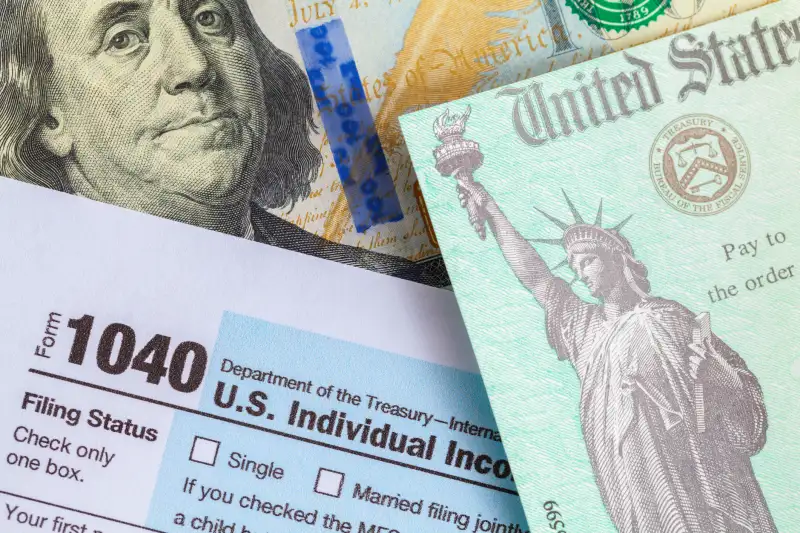3 Tips if You Need Help with IRS Back Taxes

Article Summary:
- The IRS revealed an $80 billion plan to crack down on tax evaders starting as soon as May 2023.
- Tip 1: Educate yourself on the tax relief programs available to you.
- Tip 2: Build a repayment plan based on your financial situation.
- Tip 3: Tax relief companies such as Anthem Tax Services could help you negotiate down your tax debt and streamline the process.
If you are one of the millions of Americans who owe back taxes, the IRS may contact you this May. Earlier this month, the Internal Revenue Service revealed an $80 billion plan to transform itself into a “digital first” tax collector focused on customer service and cracking down on wealthy tax evaders. Owing taxes can be intimidating and stressful, and the consequences of ignoring your tax debt can be harsh.
The IRS has the power to not only garnish your wages but seize your bank accounts, and could even exert legal action — that is why seeking help with your IRS back taxes as soon as possible is adviseable. Below are three tips to help you navigate your back taxes, including knowing the tax relief programs that may be available to you, and how to negotiate your tax debt with a solid tax relief company that works on your behalf.
Tip 1: Know what tax relief initiatives are available
If you are unable to pay your tax debt in full, you can contact the IRS to ask about the different tax relief agreements that may be available to you through the IRS Fresh Start Program. The program is a series of initiatives designed to help taxpayers who are struggling to pay their taxes and could act as a financial lifesaver for people who are eligible. It’s important to understand that some of these initiatives don’t actually reduce the amount you owe but may make paying your tax debt more manageable if you qualify.
The IRS offers several tax relief initiatives and payment plan options, including:
- Installment Agreements allow individuals to pay off their tax debt over time through monthly installment payments agreed upon with the IRS.
- Offer in Compromise is an agreement that helps taxpayers settle their tax debt for less than the full amount owed if they fall under certain eligibility requirements.
- Penalty Relief may be offered to taxpayers who can prove a reasonable cause for not paying their taxes on time.
- Currently Not Collectible Status is a program that may allow taxpayers to temporarily stop making payments on their tax debt if they are experiencing financial hardship.
Tip 2: Build a repayment plan
If you cannot pay your entire tax bill straight away, try to pay as much as you can as soon as possible. By doing so, you may reduce the number of penalties and interest amount that will accrue on the remaining balance. If you are unqualified for a payment plan with the IRS, you could consider using a credit card to make manageable monthly payments. Additionally, there are some general steps you could take to build a repayment plan and start chipping away at your back taxes.
- Determine how much you owe: This can be done by contacting the IRS or your state tax agency and requesting a copy of your tax transcript.
- Determine your ability to pay: Analyze your financial situation to determine how much you can realistically afford to pay each month. This includes your income, expenses, assets, debts, and other factors.
Tip 3: Consider working with a professional to negotiate your tax debt
Dealing with back taxes can be stressful and complicated, which is why seeking professional help may be the answer you’re looking for. Tax relief companies such as Anthem may provide the knowledge necessary to prepare and position your case and could help you save up to 99% on IRS debt. If you owe over $10k to the IRS, you could approach tax resolution yourself. However, a tax relief company could provide the support you may need to better understand your options, negotiate or settle your debt with the IRS on your behalf, and streamline the process.
Bottom Line
Don't let your tax debt spiral out of control. If you owe back taxes, take action now to avoid the severe consequences that could arise from ignoring them. By setting up a payment plan or negotiating an offer in compromise with the IRS, you can begin to address your tax debt and prevent further penalties and interest charges from accruing.
Consulting with a tax relief services company could provide invaluable guidance and support throughout the process, and help you get back on track. If you do choose to go with a tax relief company, make sure that you choose one that is accredited with one or more tax professional organizations such as the National Association of Tax Professionals (NATP), the National Association of Enrolled Agents (NAEA), and the Association of International Certified Professional Accountants (AICPA) to reduce the chances of falling for a scam.
Click here to get started with a free consultation with Anthem and take a step toward potentially settling your unpaid taxes before they start gaining interest.
The information provided on this page is for educational purposes only and is not intended as financial advice.

